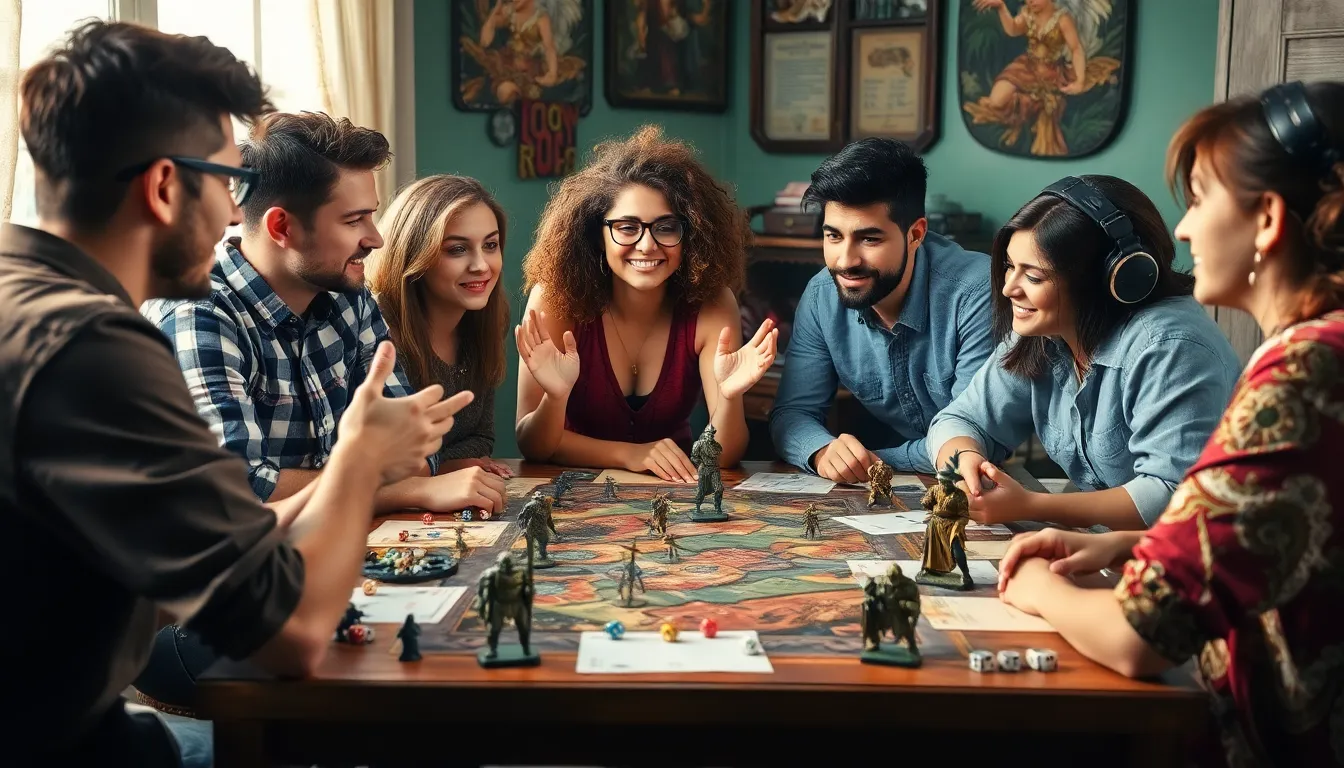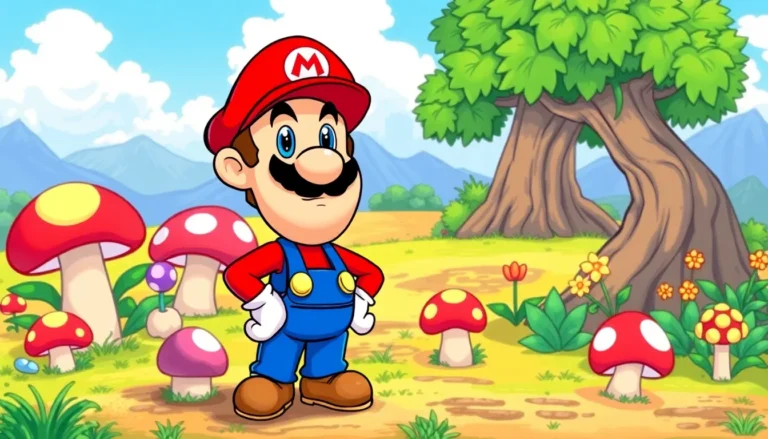In a world where dragons soar and heroes rise, RPG gameplay transports players into realms of endless possibilities. Picture this: you’re not just a spectator; you’re the valiant knight, the cunning rogue, or even the quirky bard who can charm the socks off a dragon. It’s a delightful escape from reality that invites players to craft their own epic tales, one dice roll at a time.
Table of Contents
ToggleWhat Is RPG Gameplay?
RPG gameplay involves players taking on the roles of characters in a fictional universe. Characters can range from warriors to spellcasters, each presenting unique abilities and backgrounds. Players immerse themselves in narratives, making choices that affect the story’s direction.
Game mechanics in RPGs vary widely, but they often include exploration, combat, and character development. Players encounter quests that drive engagement, often requiring problem-solving and teamwork. Resources like health points, mana, or experience points guide characters’ growth throughout the game.
Character creation serves as a vital aspect of RPGs. Players customize attributes such as strength, intelligence, and skills, shaping distinct personas. These choices influence gameplay, allowing for varied strategies and styles.
Storytelling remains central to the RPG experience. Well-crafted narratives draw players deeper into the world, creating emotional connections with characters. NPCs (non-player characters) serve as guides, presenting challenges or providing background lore.
Dungeons and encounters elevate the excitement of RPG gameplay. Players navigate labyrinths or face powerful adversaries, reinforcing collaboration and tactical planning. Victory leads to rewards, such as rare items or increased abilities, motivating further exploration.
Multiplayer options enhance social interaction within RPGs. Friends can embark on quests together, sharing experiences that build camaraderie. Many games also offer online communities, allowing players to exchange tips and tactics.
Ultimately, RPG gameplay transforms participants into heroes of their own stories. Through personal choices, immersive narratives, and strategic gameplay, players engage deeply with fantastical realms filled with adventure.
Key Elements of RPG Gameplay

RPG gameplay revolves around engaging mechanics that immerse players in unique experiences. Understanding these key elements enhances appreciation for the genre.
Character Development
Character development plays a crucial role. Players customize attributes, shaping how characters evolve throughout the game. Each choice has consequences, impacting gameplay strategies and relationships with other characters. Skills and abilities vary widely, allowing for distinctive character builds. Unique classes like mages, warriors, and rogues cater to diverse playstyles. Progression systems often include leveling up, unlocking new skills, and enhancing abilities. As players develop their characters, they form deeper emotional connections, making victories and losses more impactful.
Storytelling and Narrative
Storytelling and narrative drive the RPG experience. Compelling plots typically unfold through quests, engaging players with rich lore and intricate backstories. Choices made during gameplay often lead to branching narratives, resulting in varied outcomes based on player decisions. Each character encounter can introduce conflict or collaboration, further enriching the storyline. Well-crafted dialogue adds authenticity to interactions, allowing players to feel immersed. Emotional stakes in the narrative heighten involvement, as players become invested in their characters’ journeys.
Exploration and World-Building
Exploration and world-building enhance the RPG experience. Players navigate vast landscapes filled with secrets, treasures, and challenges. Each environment is meticulously designed, creating immersive settings that draw players into fantastical realms. Dynamic ecosystems often feature diverse creatures and factions, offering unique encounters. The freedom to explore fosters curiosity, encouraging players to interact with their surroundings. World-building elements, like quests and lore, deepen immersion and context. Engaging in exploration ultimately leads to discovering hidden stories and forming memorable experiences.
Types of RPGs
RPGs come in various forms, each offering unique gameplay experiences. Players encounter different styles, which cater to diverse preferences.
Traditional RPGs
Traditional RPGs focus on structured gameplay with turn-based mechanics. Players engage in strategic battles, often using dice to determine outcomes. These games commonly emphasize storytelling, character development, and the exploration of detailed worlds. Popular examples include classics like “Dungeons & Dragons” and “Final Fantasy.” Groups of players collaborate, creating immersive narratives through their character choices.
Action RPGs
Action RPGs blend real-time combat with traditional role-playing elements. Players control characters in dynamic environments, engaging in fast-paced battles. Character progression occurs through leveling up and unlocking new abilities, allowing customization. Titles such as “The Witcher” and “Dark Souls” exemplify this genre. Action RPGs thrive on player skill and reflexes, resulting in an adrenaline-fueled experience.
MMORPGs
Massively Multiplayer Online RPGs (MMORPGs) immerse players in expansive virtual worlds. These games support hundreds or thousands of participants simultaneously. Quests often require collaboration, fostering a sense of community and teamwork. Character interactions occur via guilds and chat systems, enriching social gameplay. Well-known examples include “World of Warcraft” and “Final Fantasy XIV.” MMORPGs prioritize ongoing content and dynamic events, allowing continuous engagement.
The Impact of RPG Gameplay on Players
RPG gameplay significantly influences player experiences, fostering emotional connections and enhancing cognitive skills. Engaging with rich narratives and character arcs leads to a heightened sense of empathy. Players often feel invested in the choices they make, affecting story outcomes and character relationships.
Character development serves as a core component of RPGs, allowing players to shape their protagonists through unique attributes. As characters grow stronger and acquire new skills, players develop strategic thinking, adapting to various challenges. This progression deepens their emotional investment and enhances satisfaction, especially with well-crafted backstories.
Storytelling remains central in RPG gameplay; compelling narratives captivate players and encourage exploration. Players uncover intricate plots while navigating diverse landscapes designed with care. Interactions with non-player characters serve to enrich the story, revealing lore and offering quests that challenge players to think critically.
Communication and teamwork are crucial in multiplayer RPGs, where collaboration fosters social connections. Engaging in cooperative gameplay leads to shared victories and losses, strengthening bonds between players. Both collaboration and competition help enhance problem-solving skills and foster a sense of community.
RPGs contribute to personal growth, offering players avenues for escapism and self-discovery. Immersion in alternate identities allows individuals to confront real-life issues while exploring different perspectives. Diverse character roles provide a safe space for experimentation, helping players develop greater confidence in their real lives.
By exploring these dynamics, the impact of RPG gameplay on players transcends mere entertainment. Through meaningful interactions, strategic thought, and emotional engagement, RPGs foster a transformative experience that resonates long after gameplay concludes.
RPG gameplay offers an unparalleled journey into imaginative worlds where players can truly become the heroes of their own stories. The blend of character development storytelling and exploration creates a rich tapestry of experiences that captivate and engage. Each choice made within the game shapes not only the narrative but also the player’s emotional connection to their character and the world around them.
As players navigate through quests and challenges they cultivate skills that extend beyond the screen fostering teamwork empathy and strategic thinking. RPGs provide a unique platform for personal growth and self-discovery allowing individuals to explore complex narratives and relationships. With every adventure embarked upon the impact of RPG gameplay lingers long after the final quest is completed.




